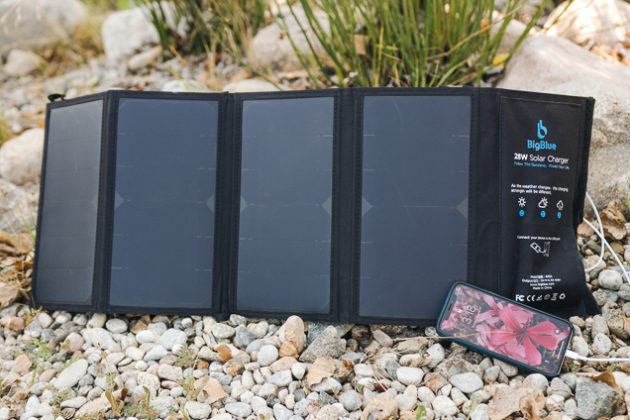The Finest Transportable Solar Charger – The New York Instances
Photo: Rozette Rago
To help decide which solar chargers to test, we started with a pool made up of Amazon's best-selling and top-rated offers, recommendations from authoritative review sites like OutdoorGearLab, and mentions on websites that specialize in technology or outdoor gear , was selected. Bad overall ratings or bad reviews from owners on Fakespot weren't automatic deal breakers, but we ditched all models with a pattern of bad ratings – those that had issues like inconsistent and slow performance, warping and bowing, or performance-related issues and mentioning flaws . Before calling models for testing, we have considered these key features:
Output power and charging
We only considered USB solar chargers that are 10 watts or more, since with less you may not get enough power all day to charge a single phone, which is just not practical. While we preferred models that claimed to be even more powerful, we didn't want the size to increase significantly, which would limit the portability of the charger.
We skipped all chargers that only had a single USB charging port. We preferred two output ports that allow you to charge a second device or share power with others. Any additional ports were a bonus. Each connection had to use at least 1 amp. This is the minimum required to fully charge a phone like the iPhone X in three to four hours.
Our pick, the BigBlue 28W USB Solar Charger, isn't much bigger than an iPad, and you can easily stow it in most daypacks. Photo: Rozette Rago
size
A good portable solar charger is sized so that you can easily fold it up and put it in a daypack – ideally, it shouldn't be much larger than an iPad. At the same time, a larger surface area is better for capturing elusive rays on a cloudy day. We have therefore discounted models with fewer than two panels. (In previous tests, we've seen poor results on small, brick-style models with a built-in battery – see our last entry in the "Competition" section.) And since backpackers or hiking campers are most likely to need a solar charger, we didn't want one Pack adds too much weight. Every model we tested weighed roughly a pound and we didn't include anything over 2 pounds.
Guarantee and reliability
We checked the company's websites and contacted customer service to make sure each model was made and sold by a reputable brand, was easy to buy, likely didn't sell out quickly, and was warranted for at least a year.
Extras
If a charger was equipped with bonus functions, we also took these into account. Features like a magnetic lock or built-in stand can make a solar charger easier to use, but only if it's already great at its core job of producing electricity and chargers. Most of the chargers we tested included a USB to micro USB cable, but some (like Anker's 3 foot cable) were longer or felt more durable than others. Many also contained some carbines. The carabiners themselves were small and chintzy across the board, but we appreciated the added ability to hang the charger from a backpack or tent.
price
Solar chargers that cost more than $ 100 either offer no significant advantages over models under $ 100 or occupy a completely different size and weight class that would be exaggerated for the casual camper or the average emergency kit. On the other end of the scale, really inexpensive solar chargers generally can't produce enough power or charge fast enough to bother. We are grappling with cheap chargers that don't produce enough power or have nasty quirks as we discussed in the "Competitive" section, and we've come to the conclusion that whatever the situation, you shouldn't rely on such models . This left us with only four chargers that hit our sweet spot in terms of maximum performance, size and weight, availability and useful functions. We tested an Anker 15 W charger (our previous pick that has since been discontinued) against three competitors:
We have also tested nine other models in the past. We'll discuss them further in the Competition section.


Comments are closed.